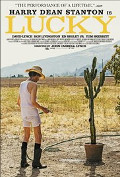
Directed by
John Carroll Lynch
88 minutes
Rated M
Reviewed by
Bernard Hemingway


Lucky
Synopsis: Lucky (Harry Dean Stanton), a US Navy veteran of advanced years living in a small desert town in the American Southwest,faces his mortality .
Although Harry Dean Stanton’s acting career stretched back to the 1950s he first hit the big-time with Wim Wenders' 1984 art-house hit, Paris, Texas. That film opened with the unforgettable sight of Stanton walking out of California's Southwestern desert so it is appropriate that his last film returns him to the same terrain. Already in Wenders’ film Stanton looked time-worn but the actor was a mere pup of 58 at the time. Here at the age of 91 he looks positively cadaverous as the chain-smoking old coot who lives alone, it seems on a diet of milk, coffee and Bloody Marys.
As Stanton’s craggy features and bony frame were essential ingredients of Wenders' film John Carroll Lynch, a busy character actor in his directorial debut makes excellent use of the actor’s aged body, opening his film with an economical sequence showing us Lucky’s morning ritual as he rises, shaves, does his token yoga exercises, dresses and heads into town to do the crossword in his local diner over coffee served, as the waitress Loretta (Yvonne Huff) puts it, “just how you like it, with lots of cream and sugar”. Just as it does Lucky’s life, It is a routine which structures a story in which nothing much happens. That is until one day when Lucky suddenly falls down, an occurrence which brings Lucky to confront the unavoidable fact of his none-too-distant demise.
The script, by actors-turned- debut-writers Logan Sparks and Drago Sumonj is a delightful mix of low key humour, quirkiness and philosophical reflection that both calls on the familiar tropes of the “dustbowl hamlet” film and yet rings its changes in the details. Drawing on Stanton's own life (Sparks was a friend) It puts Lucky in various encounters that gradually tease out his character, thoughts and feelings – a visit from Loretta during which they smoke a joint, a chance encounter with a fellow World War II vet, Lucky’s nightly visits to a bar where David Lynch makes a amusing appearance as a neighbour grieving the loss of his beloved tortoise (Lynch's scenes were also written specifically for him) as well as a moving scene in which the normally laconic Lucky breaks into impromptu song at a child’s birthday party. The result is a kind of Zen portrait, a play of presence and absence.
There is nothing particularly new in Lucky but what is there is for the most part judiciously placed and smoothly handled by Lynch's understated directing. I found Loretta’s visit to Lucky a little improbable and I’m not sure that the “money shot” of Lucky’s look straight into the camera at the film’s end worked, even if it is followed by a droll closing scene. But these are small reservations for a film that truly deserves the oft-used compliment of being more than the sum of its parts.
Want something different?





